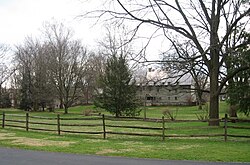Ephrata Community
|
Ephrata Cloister
|
|

Photograph of Ephrata Cloister buildings in December 2006
|
|
| Location | Jct. of US 322 and 272, Ephrata, Pennsylvania, USA |
|---|---|
| Area | 30 acres (12 ha) |
| Built | 1732 |
| NRHP Reference # | 67000026 |
| Significant dates | |
| Added to NRHP | December 24, 1967 |
| Designated NHL | December 24, 1967 |
| Designated PHMC | March 18, 1947 |
The Ephrata Cloister or Ephrata Community was a religious community, established in 1732 by Johann Conrad Beissel at Ephrata, in what is now Lancaster County, Pennsylvania. The grounds of the community are now owned by the Commonwealth of Pennsylvania and are administered by the Pennsylvania Historical and Museum Commission.
Marie Kachel Bucher, the last surviving resident of the Ephrata Cloister, died on July 27, 2008, at the age of 98.
The community was descended from the pietistic Schwarzenau Brethren movement of Alexander Mack of Schwarzenau in Germany. The first schism from the general body occurred in 1728—the Seventh Day Dunkers, whose distinctive principle was that the seventh day was the true Sabbath.
In 1732, Beissel arrived at the banks of Cocalico Creek in Lancaster County. Around this charismatic leader a semi-monastic community (the Camp of the Solitary) with a convent (the Sister House) and a monastery (the Brother House) was established, called "Ephrata". The members of the order were celibate. In addition to celibacy, the members believed in strict interpretation of the Bible, and self-discipline. Members were required to sleep on wooden benches 15 inches (380 mm) wide, with wooden blocks for pillows. They slept six hours per night, from 9 P.M. to midnight, and from 2 A.M. until 5 A.M., with a two-hour break to "watch" for the coming of Christ. They ate one small vegetarian meal a day. The only time the followers of Beissel were permitted to eat meat was during the celebration of communion when lamb was served. The members of the cloister spent much time at work or praying privately. Services every Saturday were led by Beissel, often being several hours long.
...
Wikipedia
